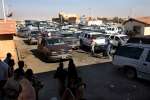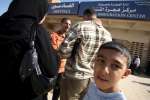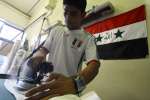- Text size
 |
|  |
|  |
| 
- Français
Renovated registry office to ease integration of Chechen refugees
Making a Difference, 14 September 2010
AKHMETA, Georgia, September 14 (UNHCR) – At some time in their life, everyone needs legal documentation, ranging from birth and marriage certificates to an ID card or a passport. In Georgia, that means going to the Civil Registry Agency (CRA).
But years of neglect and insufficient funding had left the busy CRA branch office in the north-east Georgia town of Akhmeta in poor shape, and this was affecting its ability to serve the local population, including refugees from Chechnya living in the region's Pankisi Gorge.
"Our office was built in 1946, Soviet style, and it was in a bad state. Customers waited in a drafty cold corridor; employees sat in cramped cubicles," Levan Itiuridze, head of Akhmeta office, told UNHCR visitors.
The working conditions were abysmal – freezing cold in winter and boiling hot in summer – and the equipment and facilities were antiquated. As a result, staff members were only able to handle about 15 customers a day, turning away a further 15-20.
In July last year, as part of a strategy to ease the local integration of Chechen refugees in the Pankisi and to help build the capacity of local civil servants, UNHCR funded the renovation of the branch office. The facility reopened in late August and the transformation was remarkable.
Not only has the building been renovated, but the office has been equipped with a state of the art computerized registration system connected to the Justice Ministry in the Georgian capital, Tbilisi. Before, all applications and correspondence between the ministry and Akhmeta had to be sent by road.
CRA staff in the town can now access the Justice Ministry's main computer immediately, register an applicant's details and print out the necessary documents. "The service is great now," said Koki Peradze, head of UNHCR's Akhmeta office. "If I need to renew my passport, all I have to do is go to the CRA branch office here in Akhmeta," added Peradze, a Georgian citizen.
Training of staff by UNHCR, as part of a general capacity-building strategy, was a vital component of the project, "We received training on how to improve our customer service, how to answer all the different questions, how to keep calm under pressure and how to achieve better results with the computerized system," said documentation specialist, Manana Khokhobashvili. The centre can now handle 40 customers a day.
While the civil registry caters mostly to locals, it is also very important to the nearly 1,000 refugees from Chechnya who remain in the region. They were among some 8,000 who fled across the nearby border in 1999 to escape conflict in their corner of the Russian Federation.
Most of these 8,000 either returned to Chechnya or moved to Western Europe, but those who remain in the Pankisi Gorge are being gradually integrated into the local community with the help of UNHCR. This means they need documents, which is where the Akhmeta centre plays a crucial role.
They can apply for the all-important birth certificates for children born in Georgia and for marriage certificates for couples tying the knot with other refugees or locals. And since April last year, the refugees have been able to apply at the CRA for special travel documents which allow them to go overseas for education, training or employment and to visit relatives.
And with the government now offering citizenship to the refugees, the CRA branch in Akhmeta is even busier processing applications for documents and issuing national ID cards.
The renovation work has been warmly welcomed by the Chechens. "You can't compare how it was before and how it is now. And I am not talking about nice walls and floors, but also about the service, which has also improved a lot," said Fatima Bagakhashvili.
Helping to build capacity among staff in government and non-governmental organizations is a major element of UNHCR's work in Georgia. Funds permitting, the refugee agency hopes to train staff in four more CRA offices in areas hosting nearly 250,000 forcibly displaced Georgians and 1,700 stateless people.
By Liene Veide in Akhmeta, Georgia

















































